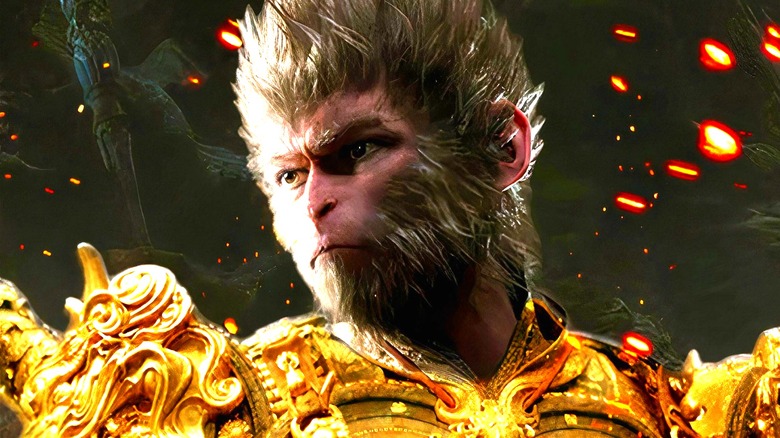Black Myth: Wukong Developer's Controversial Comments, Explained
Game Science has officially made a name for itself with its latest release. "Black Myth: Wukong" is blowing everyone away, with millions of players around the world checking out the newest soulslike on the block. Within 24 hours of its debut, "Black Myth: Wukong" hit over 2.3 million concurrent players on Steam alone. The game shot past the high watermark set by "Palworld" earlier this year, and that's even more impressive considering "Black Myth: Wukong" is a $60 single-player title. After previously working as a mobile game developer, Game Science is now at the center of the gaming world's attention — and now that people are looking at the developer a little more closely, they're starting to see things they don't like. Basically everyone agrees that "Black Myth: Wukong" is a great new soulslike game, but behind Game Science's development chops, there are signs that the studio may be dominated by a toxic work culture.
Some of Game Science's founders and employees have a history of making sexist comments online, a tendency that dates back to years before "Black Myth: Wukong" began development. More recently, the marketing team behind "Black Myth: Wukong" sent out a bizarre email to content creators who got early access to the game, giving them an interesting list of topics they shouldn't discuss while playing. As much as people are loving the new game, some are beginning to side-eye Game Science's growing reputation.
The devs have a history of sexist comments
Back in November 2023, IGN published an investigation into sexist comments made by the team at Game Science, including some of the studio's founders. Now that "Black Myth: Wukong" is on everyone's radar, more people are going back to that report, and they're shocked by what IGN discovered. For example, Game Science lead artist and co-founder Yang Qi wrote a post on Weibo back in 2013, in which he argued about the biological differences in male and female gamers. He wrote that men tend to be more interested in violent video games with complex mechanics and women like simple games with cute pets and collectibles. It should go without saying that biology and gender don't really determine gaming preferences, but Yang took his argument even further by urging developers to ignore game design elements that he viewed as appealing to women: "You don't need the reverse motivation of female players, you don't need to take care of those worms who just want to date chicks," Yang wrote. "Some things are just for men." The post concludes with the sentiment, "If I really like soft and effeminate things, I just need to make something different, and wear stockings and suspenders to work everyday ... this is what I call professionalism."
It's not just that Yang and some of his fellow co-founders espouse sexist views online. The arguably even bigger problem is that those views seem to have become part of Game Science's internal culture. The company has previously used recruitment ads that featured sexual imagery and made jokes about having sexual relations with their coworkers. More recently one of the technical artists who worked on "Black Myth: Wukong" also wrote comments online about fetishizing characters from the game.
Streamers got some strange instructions
The aforementioned remarks don't look good at all, and the company isn't doing much to change that image at the moment. When streamers and content creators were given early access to "Black Myth: Wukong," they also received an email from the game's co-publisher Hero Games, which gave them a list of things to avoid while streaming the game. According to IGN's sources, that list included some fairly standard items, like not using offensive language and not insulting other creators. It also included some more concerning items, including the following: "Do NOT use trigger words such as 'quarantine' or 'isolation' or 'COVID-19'," "Do NOT discuss content related to China's game industry policies, opinions, news, etc," and "Do NOT include politics ... feminist propaganda, fetishization, and other content that instigates negative discourse."
In light of Game Science's history, instructing streamers not to talk about "feminist propaganda" has made some fear that the company has no intention of changing its culture. When PC Gamer asked a member of the company about IGN's report, they said, "We have no comment, we're sorry."



